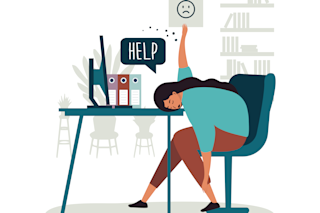There’s job stress, and then there’s the crushing pressure paramedics went through during the first wave of the Covid-19 pandemic. The uncertainty, the dread, the constantly changing protocols, the shortages of personal protective equipment, the multiple calls to the same nursing home — it was almost too much for Kate Bergen of Manahawkin, New Jersey.
“It felt like everything was closing in around us,” Bergen says. “At some point I knew that I couldn’t take any more. Was I headed for a meltdown? Was I going to just walk off the job one day? I was getting very close to that point.”
Instead of quitting, Bergen found a calling. One day while waiting for the next emergency call, she took a picture of herself in her full PPE. The image inspired her to paint a self-portrait poster in the style of World War II icon Rosie the Riveter. The message: ...














